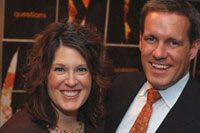 Over at the CBMW blog–the new site is jusssstttt about to debut–we just published a terrific piece from Candice Watters, cofounder of Boundless.org and one of the most gifted commentators around on issues related to womanhood and biblical maturity.
Over at the CBMW blog–the new site is jusssstttt about to debut–we just published a terrific piece from Candice Watters, cofounder of Boundless.org and one of the most gifted commentators around on issues related to womanhood and biblical maturity.
Candice interacts with the recent best-seller by Hanna Rosin, The End of Men. Rosin suggests in the book that men and women are essentially interchangeable in terms of the roles they fill in the home. Candice suggests otherwise, as you can see in this excerpt:
Who needs men? Rosin came around to say “ultimately we need each other … for human connection.” That’s a start, but it doesn’t go far enough. It’s self-serving and doesn’t require distinctions. The answer from Scripture is we all do: Christian women need Christian men and families need them and societies need them and churches need them.
- Women who hope to get married need them. Men alone are husbands.
- Women who hope to have children need them. Men alone are fathers.
- Mothers who desire for their children to be raised in the fear and admonition of the Lord need them. Throughout Scripture, the commands to teach children are directed to fathers. Mothers are charged to help, but the final responsibility rests with fathers.
- Women who desire to be taught in a church that conforms to biblical norms need them. Without men as elders and pastors, we have no church as the New Testament describes it.
Rosin’s book is definitely worth engaging. It makes strong arguments that will have considerable real-life consequences if followed. I enjoyed Rosin’s writing and shrewd journalism, but I fear that her brave new sexual order bodes ill for families.
Candice speaks to why this is so in her piece; in my own reading of The End of Men, I was surprised by how lightly Rosin treated two areas in particular: firstly, young women buying into a thoroughly sexualized culture, which she presented as harmless but is in reality devastating to the moral and emotional lives of those who buy in (of whatever gender–see the recent spate of essays detailing the effects of pornography culture on young men).
Secondly, single mothers whose difficulties Rosin overlooks in her excitement over a seemingly emancipated womanhood. In the book’s most poignant–and telling–anecdote, Rosin relates how she ran into a single mother who fell asleep on the elevator due to her busy schedule. In one sense, this kind of story is heroic, because many single mothers today are suffering because of men who are breaking their commitments. In another sense, though, such anecdotes show not a narrative of triumph, of womanly ascendancy, but of destitution that will have major consequences for mothers and their children.
In other words, we should recognize the heroic efforts of single mothers who soldier on for the sake of their children. But we should note clearly that such women are very likely not thriving, but are struggling. I’m sorry to say that I think Rosin reads her anecdote wrongly, and her confusion may provide the wrong kind of direction for women who will think that single motherhood is a healthy and happy choice.
There’s so much to engage in the contemporary discussion of sexuality and gender. CBMW is involved in this conversation not because we’re trying desperately to uphold an outmoded version of human culture, but because we love our neighbor, and we see that the way they will flourish is through biblical wisdom, and the gospel of grace that saves us to love it and live it out as men and women.











